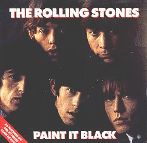In 1966, the Melody Maker wrote in their review section, ‘Paint It Black is a glorious Indian raga-riot that will send the Stones back to number one,’ they were right. What makes it, is the lead instrument, which, as Bill Wyman said, “Brian Jones playing the sitar gives it a whole new thing.”
Paint It, Black was written in March 1966 during the Rolliing Stones’ tour of Australia. It was written as a ballad originally, “But then it became a comedy track,” admitted Keith Richards in Rolling Stones magazine. “Bill (Wyman) was playing an organ and doing a take-off of our first manager Eric Easton, who had started his career as a cinema organist and the intro sounded alright so we kept it in. Charlie Watts joined in and improvised a double-time drum pattern, echoing the rhythm heard in some Middle Eastern dances. This new more upbeat rhythm was then used in the recording as a counterpoint to the morbid lyrics.
It was a bad time in the world with the Vietnam War raging but musically it was bouncing. The Beach Boys were about to release Pet Sounds and the Beatles were finishing up Revolver, but the Rolling Stones had recorded an album with 14 songs on called Could You Walk on Water, but it was never released and remains in the vaults of Decca records. The reason being, according to a record company spokesman at the time, “Our label will not issue it with that title at any price”. Instead the songs were used for their next album Aftermath.
It was the first Rolling Stones album featuring all songs written by Jagger and Richards. The British pressing featured 14 tracks and ran to just over 52 minutes, a lengthy album for the time. It opened with the track Mother’s Little Helper which the Yanks refused to have on their copies because of the drug connotations, so the American pressing had 11 tracks and ran for just under 43 minutes opening with Paint It Black, which was not on the UK copy.
Keith Richards explained how it came to feature a sitar, “We were in Fiji for about 3 days. They make sitars and all sorts of Indian stuff. Sitars are made out of watermelons or pumpkins or something smashed so they go hard. They’re very brittle and you have to be careful how you handle them. We had the sitars; we thought we’d try them out in the studio. To get the right sound on Paint It Black we found the sitar fitted perfectly. We tried a guitar but you can’t bend it enough.” In addition to Bill’s organ, there is a piano track played by Jack Nitzsche. The bass was also overdubbed by Bill Wyman playing on the bass pedals of a Hammond B3 organ.
Paint It Black is not a happy tune in its lyrics. It is written from the viewpoint of a person who is depressed and wants everything to turn black to match their mood. The song seems to be about a lover who died hence the line; ‘I see a line of cars and they’re all painted black’, referring to the hearse and limos. The line; ‘With flowers and my love both never to come back’ is about the flowers from the funeral and her in the hearse. He talks about his heart being black because of his loss. ‘I could not foresee this thing happening to you,’ implying an unexpected or sudden death and ‘If I look hard enough into the setting sun, my love will laugh with me before the morning comes’ would refer to her in Heaven. Incidentally Jagger got the line ‘I turn my head until my darkness goes’ from James Joyce’s Ulysses. There was talk at the time that the subject may have been Jackie Kennedy who, in the face of the public, dealt with the death of her husband, John F. It is reflecting the possible thought process she may have faced during the funeral and grieving process, but this has never been confirmed.
I have always wondered why the label shows the title as Paint It, Black (with the comma), well according to Bill Wyman at a 2001 book signing in Nashville, “It didn’t originally have the comma but it was simply a typographical error by the label and it stuck.”
The song reached number one on both sides of the Atlantic. It had also featured under the closing credits of the 1987 film Full Metal Jacket and ten years later in the closing credits of The Devil’s Advocate. Additionally it was used in the opening credits of the CBS television series Tour of Duty, an episode of CSI: Miami and for a TV advert for Dior Homme Sport cologne.
Many have covered the songs too with versions by Deep Purple, Vanessa Carlton, Elliott Smith and The Mo-Dettes who just missed the top 40 in 1980. Even U2 had it on the B-side of Who’s Gonna Ride Your Wild Horses.
The Stones version was re-issued, without the comma, in 1990 and, bizarrely, made number one in the Netherlands.
The Stones former manager Allen Klein owns the publishing rights to Paint It, Black and in 1965, The Stones hired him and signed a deal they would later regret. With Klein controlling their money, The Stones signed over the publishing rights to all the songs they wrote up to 1969. Every time this is used in a commercial or TV show, Klein gets paid.
